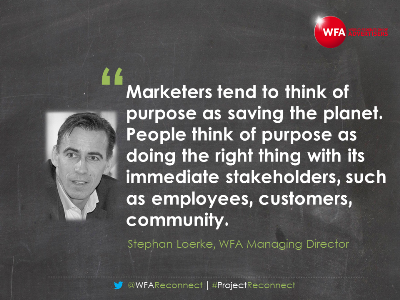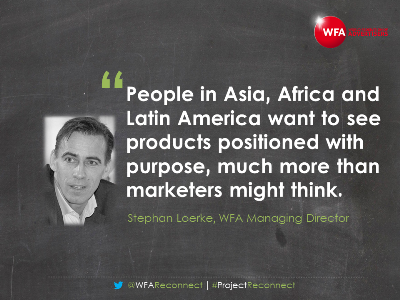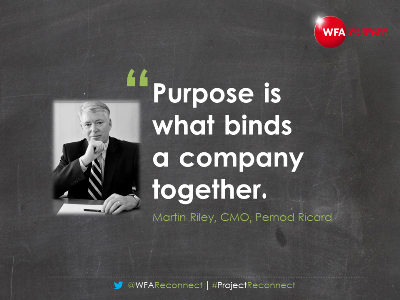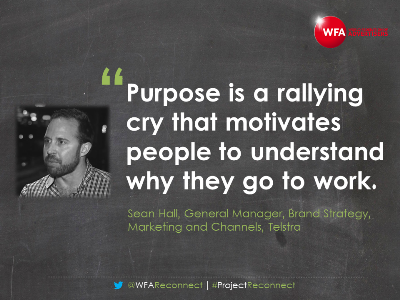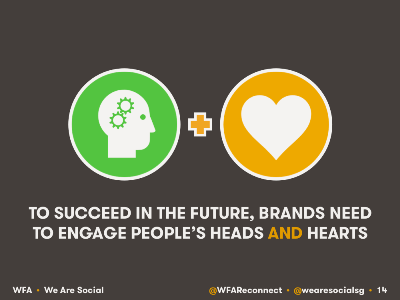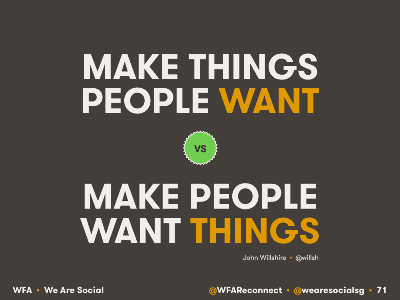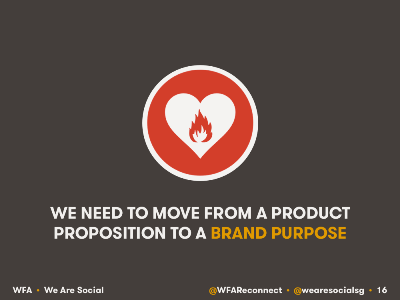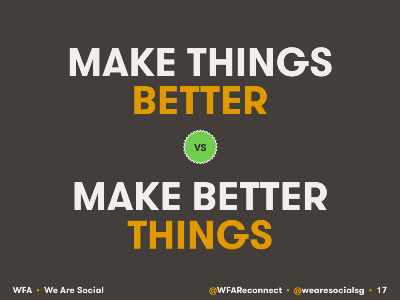This post is part of the WFA's Project Reconnect, and is written by Will Gillroy, Director of Communications at the WFA, and Simon Kemp, Regional Managing Partner for We Are Social in Asia.
Brand purpose: you don't know the half of it
Purpose isn't about saving the planet (although it can be). Marketers should take a wider view of the power of purpose, suggests Will Gilroy, Director of Communications at the WFA.
When marketers think about purpose and the brands that epitomize it, they often just see half the picture.
They rightly look at brands such as Dove, TOMS Shoes, The Body Shop and Patagonia for inspiration.But while these are clearly purposeful brands, they only represent part of what purpose is about.
We've been researching what purpose means to brand marketers for a few years now. Our latest findings can be seen here.
Edelman does the same with consumers. Their Good Purpose research tracks consumer views about what makes for a purposeful brand.
Purpose need not be worthy
The Edelman data certainly tell us that purpose is important to consumers. 36% globally say they buy a brand that supports good causes at least once a month. And the WFA's research shows that 87% of marketers think it's important for brands to have a sense of purpose.
But the Edelman research tells us that purpose is much more than saving the planet. It may sound plain and intuitive but people don't think, 'what's that company's purpose?'. They just like some companies more than others.
And while that impression may be impacted by lofty ambitions to save whales or impact climate change, more often than not it's about providing decent customer service and doing the right thing by immediate stakeholders, such as employees, suppliers and local communities.
Marketers tend to equate purpose with trying to positively impact communities, improving the environment and ethical business activities.
Consumers say the top attribute is the ability to listen to and respond to customer needs and feedback. The next most important attribute that builds trust is high quality products and services, with treating employees well coming in at No 3.
People globally seek purpose. It's not just a Western thing
Critically, these are not just developed market concerns for consumers in North America and Western Europe. The Edelman research shows how they are particularly relevant for developing markets, where the impact of unethical behaviour often falls heaviest or where people live in closer proximity to poverty on a daily basis.
China, India and Brazil all scored significantly higher than the global average when consumers were asked if they would pay a premium for a product that supports good causes, for example.
The wider view of purpose expressed by consumers opens the doors for brands and marketers to take purpose in new directions. Eighty-nine percent of marketers recognize that purpose needs to pervade the entire organization and have buy-in from all business functions.
Purpose, as powerful internally as externally
Critically, purpose gives companies a chance to motivate and attract talent. A company with purpose is clearly a more attractive proposition in an industry where the very best can pick and choose who they work for.
We've had a number of WFA members recently come to us to talk about how purpose can be used internally to inspire and motivate their workforce.
Companies are looking at new ways of unlocking the potential of corporate or brand purpose to galvanise employees and put a spring in their step.
The other side of purpose is its power to open internal doors to the marketing department.
If purpose is about doing the right thing, behaving well and responding to customer questions, then marketing needs to kick off the dialogue with all these different areas.
Purpose puts marketing at the heart of the operational business of the company and allows it to build bridges with these departments, ensuring that what's said in public matches what's being done in private.
At Unilever, CMO Keith Weed is also responsible for leading the company's sustainability agenda, further evidence that marketers are increasingly reaching beyond their TV, digital and outdoor messages to create meaningful dialogues that reflect every aspect of their company.
The truth about purpose is that too many companies focus on just one aspect of it, when it can deliver so much more.
Brands with purpose
Simon Kemp, Regional Managing Partner for We Are Social in Asia, on why all brands today must be 'purposeful' – and how you can build one.
In today's competitive world, a great product is no longer enough for a brand to succeed.
A great product is still critical of course – no-one would willingly buy a bad product twice. But as functional performance differences between companies' offerings become ever more marginal, people increasingly rely on more intangible, emotional factors to inform and guide their choices.
As a result, the rules of the marketing 'beauty pageant' have changed. Today, brands can no longer rely on good looks alone; they need depth and soul too. Above all, they need a higher-order 'purpose'.
But what does a 'brand purpose' look like?
A purpose inspires hearts and heads
Given the choice between similar (and similarly priced) alternatives, people usually go for the option that makes them feel good.
Making people feel good isn't just about hedonism though; brands that make a meaningful contribution to society, or brands that help people to reduce their impact on the environment, are also highly compelling.
A brand's purpose doesn't need to be about saving the world though; brands that offer people hope, or inspire them to improve themselves, are also well placed to earn a place in people's hearts.
Tip #1: A great purpose engages people's hearts, not just their heads.
A purpose goes beyond money
Ask businesspeople why their organisation exists and most will offer a reply along the lines of “to make a profit”. But if all businesses exist solely to make a profit, there's very little differentiation between them.
Meanwhile, unless they happen to be company shareholders, none of your audience cares whether your organisation makes a profit. Indeed, making too much profit can actively turn people against you (think Occupy Wall Street).
If you want to compel people to choose your brand, you need to stand for something more meaningful than simply 'selling stuff to make money'.
Critically, you need to show people how you help them succeed, not just how you will succeed with their money.
Tip #2: Make sure your brand's purpose articulates the value to your consumer, as well as to your organisation.
Define your promise before you define your product
People don't buy what brands make; they buy what brands make happen for them.
Think of it this way: people don't pay for shampoo; they pay for clean, beautiful hair – and the psychological and emotional benefits that beautiful hair brings (e.g. self-confidence).
Moreover, for your customers, products and services are simply means to an end, and these products and services are increasingly at risk from leftfield alternatives that deliver those same 'ends' in new or different ways.
In the most extreme cases, these alternatives can destroy entire industries in a matter of months (think Kodak). However, by building your brand around the benefits you promise rather than the products you make, you can elevate your brand beyond product-centric comparison.
At the same time, you also make it easier to extend your brand beyond a specific product category (think TOMS, who have credibly expanded from shoes into eyewear and coffee).
Tip #3: A brand purpose articulates what people can buy into, not just what they can buy.
Making it different vs. making a difference
Too many brands mistake novelty and distraction for differentiation. However, such an approach is very difficult to sustain. It may bring in the first sale, but novelty quickly wears off, and the brand must resort to increasingly impressive spectacle to keep people interested.
There's an easy way round this though: by focusing on how your brand makes people's lives better, or how it makes the world a better place, you stand a much greater chance of keeping people coming back for more.
The Essential Tip: Strive to make things better, not just to make better things.

